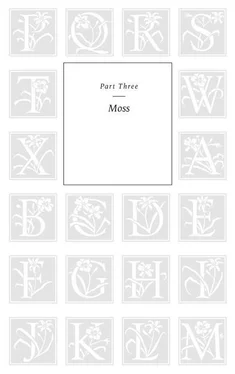Vanessa Diffenbaugh - The Language of Flowers
Здесь есть возможность читать онлайн «Vanessa Diffenbaugh - The Language of Flowers» весь текст электронной книги совершенно бесплатно (целиком полную версию без сокращений). В некоторых случаях можно слушать аудио, скачать через торрент в формате fb2 и присутствует краткое содержание. Жанр: Старинная литература, на английском языке. Описание произведения, (предисловие) а так же отзывы посетителей доступны на портале библиотеки ЛибКат.
- Название:The Language of Flowers
- Автор:
- Жанр:
- Год:неизвестен
- ISBN:нет данных
- Рейтинг книги:4 / 5. Голосов: 1
-
Избранное:Добавить в избранное
- Отзывы:
-
Ваша оценка:
- 80
- 1
- 2
- 3
- 4
- 5
The Language of Flowers: краткое содержание, описание и аннотация
Предлагаем к чтению аннотацию, описание, краткое содержание или предисловие (зависит от того, что написал сам автор книги «The Language of Flowers»). Если вы не нашли необходимую информацию о книге — напишите в комментариях, мы постараемся отыскать её.
The Language of Flowers — читать онлайн бесплатно полную книгу (весь текст) целиком
Ниже представлен текст книги, разбитый по страницам. Система сохранения места последней прочитанной страницы, позволяет с удобством читать онлайн бесплатно книгу «The Language of Flowers», без необходимости каждый раз заново искать на чём Вы остановились. Поставьте закладку, и сможете в любой момент перейти на страницу, на которой закончили чтение.
Интервал:
Закладка:
“Don’t pay full price!” she called after me as I hurried away. “Tell them it’s for me!”* * *
The next morning, Renata sent me to the flower market alone. We had arranged flowers and tied nosegays until five for a six-o’clock wedding, and the stress had launched her into bed rest. Her shop was to be open every Sunday from now on; she’d created a new sign and told all her regulars I would be there. She gave me cash, her wholesale card, and a key. Taping her home phone number to the cash register, she told me not to bother her for any reason.
When I arrived at the flower market, the sky was still dark, and I almost didn’t see him standing to the right of the entrance. He was still, and flowerless, his head bent to the ground but his eyes up, waiting. I walked to the door with a purposeful step, eyes on the metal handle. The market would be busy and loud, but outside it was nearly silent. As I passed he raised a hand, holding up a rolled paper tied with a yellow ribbon. I took the scroll like a runner taking a baton, never breaking stride, and opened the door. The noise greeted me like the roar of a crowd. When I peeked back over my shoulder, he was gone.
Inside, his booth was empty. I crouched inside the white wood, untied the ribbon, and unwrapped the scroll. The paper was visibly old, yellowed and flaking at the corners. It resisted straightening. I held the two bottom corners down with my big toes, the top corners with my thumbs.
The paper held a drawing in faded graphite, not of a flower but of the trunk of a tree, its bark textured and peeling. I ran my fingertip along the bark; although the paper was flat, the drawing was so realistic I could almost feel the rough knobs. In the bottom right-hand corner were the words White Poplar in a curving script.
White poplar. It was not a plant I knew by heart. Taking off my backpack, I withdrew my flower dictionary. I scanned the W’s first, then the P’s, but neither white poplar nor poplar, white was listed. If there was a meaning, I wouldn’t be able to glean it from my dictionary. I rerolled and tied the scroll with the ribbon, but stopped midway through the bow.
On the underside of the ribbon, in a scratchy hand I recognized from flower prices on a chalkboard, were the words Monday, 5 p.m., 16th and Mission. Donuts for dinner . The black ink had spread into the silk so that the words were almost unreadable, but the time and place were clear.
I bought flowers that morning without thinking, without bargaining, and when I opened the shop an hour later, I was surprised by the things I carried.
The morning was slow, and I was grateful. I sat on a tall stool behind the register and flipped through a heavy phone book. The number listed for the San Francisco Public Library had a long recorded message. I listened to it twice, jotting down hours and locations on the back of my hand. Main Library closed at five p.m. on Sundays, as did Bloom. I would have to wait until Monday. Then, based on the meaning I uncovered, I would decide whether or not to meet for donuts.
At the end of the day, just as I had transferred the display flowers from the window to the walk-in, the front door opened. A woman stood alone, looking confused in the empty space.
“Can I help you?” I asked, feeling impatient and ready to leave.
“Are you Victoria?”
I nodded.
“Earl sent me. He asked me to tell you he needs more of the same, exactly the same.” She handed me thirty dollars. “He said to keep the change.”
I placed the money on the counter and went into the walk-in, not sure if we had enough spider mums. I laughed aloud when I saw the giant bunch I had purchased that morning. What remained of the periwinkle sat forgotten on the floor, where I had left it the week before. Renata hadn’t watered the plant, and it was dry but not dead.
“Why didn’t Earl come?” I asked as I began the arrangement.
The woman’s eyes flitted between my work and the window. She had the energy of a trapped bird.
“He wanted me to meet you.”
I didn’t say anything, and didn’t look up. In my peripheral vision I could see her pull at the roots of her burgundy-brown hair, the color covering what was probably speckled gray.
“He thought you might be able to make me a bouquet—something special.”
“For what reason?” I asked.
She paused, looking out the window again. “I’m single but don’t want to be.”
I looked around. My success with Earl had made me confident. She needed red roses and lilac, I decided, neither of which I had purchased. I tended to avoid them. “Next Saturday,” I said. “Can you come back?”
She nodded. “Lord knows I can wait,” she said, rolling her eyes. She watched my fingers fly in circles around the mums in silence. When she walked out the door ten minutes later, she seemed lighter, jogging up the block toward Earl’s like a much younger woman.
I rode the bus to Main Library the next morning and waited on the steps until it opened. It didn’t take me long to find what I was looking for. Books on the language of flowers were on the top floor, wedged between the Victorian poets and an extensive gardening collection. There were more than I had expected. They ranged from ancient, crumbling hardcovers like the one I carried to illustrated paperbacks that seemed to have come from antique coffee tables. All the volumes had one thing in common—they looked as though they hadn’t been touched in years. Elizabeth had told me the language of flowers was once common knowledge, and it always amazed me that it had retreated into the virtual unknown. I stacked as many books as I could carry onto trembling arms.
At the nearest table I opened a leather-bound volume, its once-gilded title faded to a scattering of gold dust. The card in the inside pocket had last been stamped before I was born. The book contained a complete history of the language of flowers. It began with the original flower dictionary published in nineteenth-century France and included a long list of the royalty who had courted with the language, giving detailed descriptions of the bouquets they traded. I skimmed to the end of the book, which listed a brief dictionary of flowers. White poplar was not included.
I scanned a half-dozen more books, my anxiety growing with each volume. I was afraid to know the stranger’s response but even more afraid that I wouldn’t find the definition and would never know what he was trying to say. After twenty minutes of searching, I finally found what I was looking for, a single line between plum and poppy. Poplar, white. Time . I exhaled, relieved but also confused.
Closing the book, I pressed my head against its cool cover. Time, as a response to presumption, was more abstract than I had hoped. Time will tell? Give me time? His response was unspecific; he had clearly not learned from Elizabeth. I opened another book and then another, hoping for an extended definition of the white poplar, but a search of the entire collection did not yield a second reference. I was not surprised. It didn’t seem that poplar, a tree, would be a plant of choice for romantic communication. There was nothing wistful about the passing of sticks or long strips of bark.
I was about to re-shelve the books when a pocket-sized volume caught my eye. The cover was illustrated with drawings of flowers in a grid of small squares, the definition in tiny print below each image. In the bottom row were delicately rendered drawings of roses in every hue. Under the faded yellow rose was the word jealousy .
Had it been any other flower, I might not have noticed the discrepancy. But I had never forgotten the sorrow that passed over Elizabeth’s face when she gestured to her yellow rosebushes or the thoroughness with which she snipped every young bud in the spring, leaving them to shrivel in a pile by the garden fence. Replacing infidelity with jealousy—this changed the meaning entirely. One was an action, the other only an emotion. Opening the small book, I scanned the pages, then set it down and opened another.
Читать дальшеИнтервал:
Закладка:
Похожие книги на «The Language of Flowers»
Представляем Вашему вниманию похожие книги на «The Language of Flowers» списком для выбора. Мы отобрали схожую по названию и смыслу литературу в надежде предоставить читателям больше вариантов отыскать новые, интересные, ещё непрочитанные произведения.
Обсуждение, отзывы о книге «The Language of Flowers» и просто собственные мнения читателей. Оставьте ваши комментарии, напишите, что Вы думаете о произведении, его смысле или главных героях. Укажите что конкретно понравилось, а что нет, и почему Вы так считаете.












